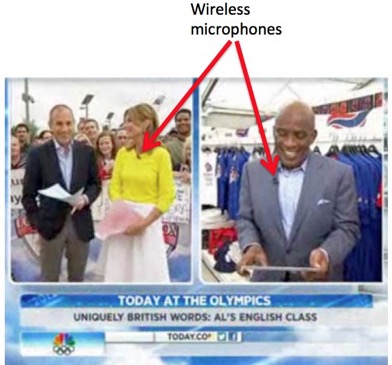Olympic News: Wireless Mics Work Well in a Marketplace Environment!
06 08, 12 15:41 Filed in: Wireless Mic Issue | spectrum policy

Watching the Olympics, you might not have noticed an interesting spectrum policy point: Wireless microphones (mics) are being used widely without any technical problems in a spectrum policy environment very different from the US: wireless mic users like most other spectrum users in the UK (including military users) are paying for spectrum access!
As we enter the era of incentive auctions, one of the issues people in Washington do not want to talk about is the future of wireless mics and their current spectrum. Clearly wireless mics are a socially constructive and economically important use of spectrum for the entertainment industry, conference facilities, and other applications. But wireless mics developed in the US on the assumption that interstitial use of “vacant” TV channels was a “free good”. Under NTSC analog technology with the UHF taboos resulting from poor TV receiver technology, or at least poor predictions of TV receiver technology, this was mostly true. Of course, the questionable large scale marketing by companies like Shure, Inc. of wireless mics to users not legally eligible to use them only complicated the issue.
Similarly the unwillingness of the entertainment users of wireless mics to confront the legal contradictions of using the technology as a key building block of their shows until Docket 04-186 showed up was also irresponsible, (One wonders about Walt Disney Co. with respect to its dual roles as a TV broadcasters with multiple licenses and the owner of Broadway shows that violated the Communications Act through their illegal use of wireless mics until recently. Had their lawyers done a risk analysis of this issue?)
It does not take much of a crystal ball to see that in the long term wireless mic use of UHF-TV spectrum will become questionable as this spectrum is in greater and greater demand. While mire less mics are important, their use is very sparse in space and time and normal allocation models are not a good match.
In the UK, Ofcom’s “dedicated band manager” for “programme-making and special events”/PMSE is JFMG, which is now owned by Arqiva, the company that actually owns and operates broadcast transmitters in the UK - operated on behalf of the programming originators. JFMG buys spectrum at market prices and then leases it for PMSE uses such as wireless mics to users who pay according to the amount of resources they use.
As we have seen in the Olympics it works! I suppose NBC would have preferred the US system where spectrum access is free. But why is that so important? While marketplace forces do not work all the time for all applications, the UK-style system is probably a better way to handle the wireless mic problem and will ease the inevitable transition to new technologies in various bands. Does anything think FCC really has the patience to handle that well?
blog comments powered by Disqus



![Validate my RSS feed [Valid RSS]](valid-rss-rogers.png)

